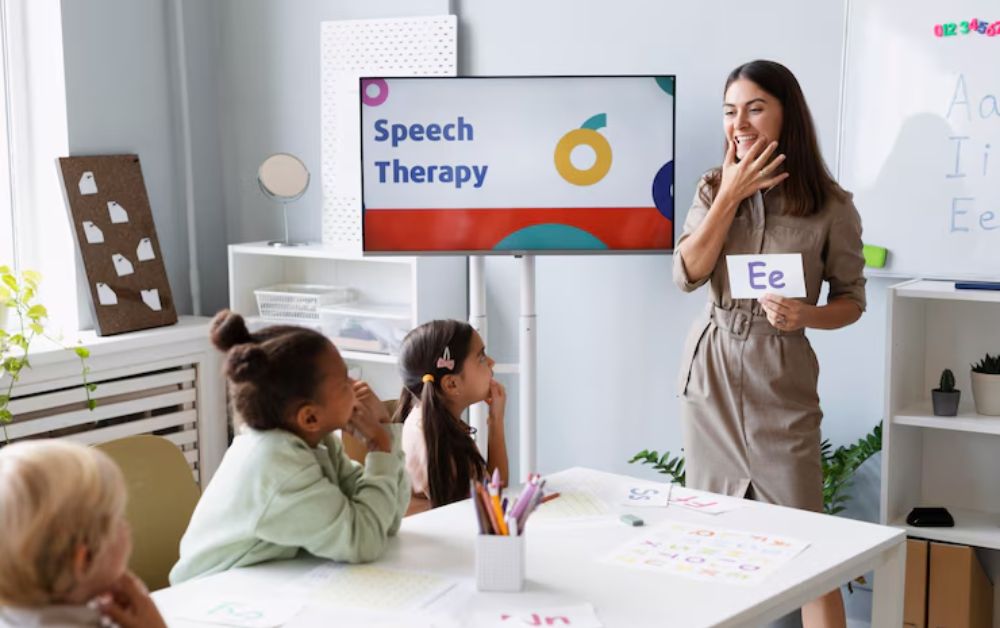
In our increasingly globalized world, speaking English fluently is more crucial than ever. Good English speaking skills can be a highly valuable asset if you want to succeed in your professional life, travel abroad fearlessly, or communicate with others from diverse cultures. But for many non-native speakers, it’s not easy to become fluent in English. The good news is that with the appropriate strategies and regular practice, everyone can become better. In this blog, we shall present the most effective tips on how to develop your English speaking skills that are practical, efficient, and easy to implement.

1.Practice Speaking Daily
Practicing daily is one of the best ways to enhance your English speaking abilities. Speaking frequently makes you more at ease with the language and increases your confidence. Even when you don’t have a native English speaker with whom you can converse, you can still practice by talking to yourself. Talk about your day, say things out loud that you are thinking, or read a book and attempt to restate the content.
You can also talk to language exchange apps or search for online speaking partners seeking to enhance their English. Integrating speaking into your daily habits, such as brushing your teeth or having breakfast, matters most.
2.Increase Your Vocabulary
You require a good vocabulary to speak fluently and convey your thoughts clearly. Attempt to learn new words daily and practice using them in sentences so that you can recall them easily. Begin with frequently used words and slowly incorporate more complex vocabulary.
Flashcards, apps, and word lists can be helpful. Movie-watching, book-reading, and podcast-listening are great options for picking up words in context. Always attempt to comprehend not only the definition of a word but how and when it is utilized.
3.Listen Actively and Carefully
Listening is an essential part of language acquisition. The more you listen, the better you grasp pronunciation, rhythm, and sentence structure. Listen to native speakers via English-language films, television programs, audiobooks, or podcasts.
Practice shadowing, a method where you repeat what the speaker has said as soon as you hear it. This aids in pronunciation, intonation, and fluency. Active listening also enhances your understanding and speaking ability.
4.Think in English
Another major obstacle for non-native speakers is the tendency to translate thoughts from their mother tongue into English. This makes the process of speaking slower and more difficult to sound natural. To avoid this, practice thinking in English.
Begin with little things—such as labeling objects in your surroundings in English or scheduling your day using English expressions in your mind. Over time, this will enable you to construct sentences faster and more naturally when you speak.
5.Work on Pronunciation and Accent
Good pronunciation is key to clear communication. Regardless of perfect grammar, poor pronunciation can result in miscommunication. Utilize online resources such as YouTube videos, pronunciation apps, and language learning websites that provide native pronunciation models.
Compare your pronunciation to that of native speakers by recording yourself speaking. Please focus on and practice sounds that are absent from your native tongue on a regular basis. Recall that understanding, not having a flawless accent, is the aim.
6.Don’t Be Afraid to Make Mistakes
Most students avoid speaking English for fear of error. Such fear can become a significant impediment to fluency. Don’t forget that errors are a regular part of the learning process. Each error is a chance to learn and become better.
The more you talk, the more you will learn. Native speakers are generally helpful and respectful of your attempt to communicate in their language. So go ahead—speak out and learn through your experience.
7.Join English Speaking Clubs or Groups
Become a member of a group of learners and improve your speaking ability significantly. English speaking clubs-online and offline-provide an opportunity to practice speaking in a relaxed atmosphere.
Group discussions, role-plays, and conversations about topics enhance your fluency and give you more confidence. You can begin by listening if you are shy and speaking up more as you become comfortable.
8.Utilize Technology
Innumerable apps and online resources are available to aid you in speaking English better. Duolingo, HelloTalk, Cambly, and FluentU are platforms that provide interactive lessons and the chance to practice speaking with real individuals.
Most AI-based tools also give immediate feedback on your pronunciation and grammar. Regularly using these tools can speed up your learning process and make your practice sessions more interesting.
9.Learn Phrases, Not Just Words
Learning whole phrases or chunks of language is usually more helpful than teaching words individually. It makes you sound more natural and fluid when you use it.
For instance, rather than learning the word “interested,” remember the phrase “I’m interested in.”
This helps you get used to sentence structure and habitual expressions so that you can develop sentences spontaneously in a conversation.
10.Be Patient and Stay Consistent
Improving your spoken English language won’t happen overnight. Take time, stay patient, and make a sustained effort. Choose achievable goals, monitor your advancement, and admire little wins here and there.
Even devoted practice for as little as 15–30 minutes daily may bear much weight over time. The more diligently you practice regularly, the more quickly you observe results.

Conclusion
It’s all about a walk, not a race. You can be a fluent and confident speaker with the correct attitude, regular practice, and hands-on techniques. Practice every day, learn new words, practice pronunciation, and don’t worry about making mistakes. Follow the tips discussed in this blog as a guide, and you’ll soon notice that you communicate in English more naturally and effectively. Practice, stay motivated, and remember that every word you say brings you closer to fluency.
